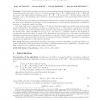Free Online Productivity Tools
i2Speak
i2Symbol
i2OCR
iTex2Img
iWeb2Print
iWeb2Shot
i2Type
iPdf2Split
iPdf2Merge
i2Bopomofo
i2Arabic
i2Style
i2Image
i2PDF
iLatex2Rtf
Sci2ools
MOR
2010
2010
Proximal Alternating Minimization and Projection Methods for Nonconvex Problems: An Approach Based on the Kurdyka-Lojasiewicz In
We study the convergence properties of an alternating proximal minimization algorithm for nonconvex structured functions of the type: L(x, y) = f(x)+Q(x, y)+g(y), where f : Rn → R∪{+∞} and g : Rm → R∪{+∞} are proper lower semicontinuous functions, and Q : Rn × Rm → R is a smooth C1 function which couples the variables x and y. The algorithm can be viewed as a proximal regularization of the usual Gauss-Seidel method to minimize L. We work in a nonconvex setting, just assuming that the function L satisfies the Kurdyka-Lojasiewicz inequality. An entire section illustrates the relevancy of such an assumption by giving examples ranging from semialgebraic geometry to “metrically regular” problems. Our main result can be stated as follows: If L has the Kurdyka-Lojasiewicz property, then each bounded sequence generated by the algorithm converges to a critical point of L. This result is completed by the study of the convergence rate of the algorithm, which depends on the geo...
| Added | 29 Jan 2011 |
| Updated | 29 Jan 2011 |
| Type | Journal |
| Year | 2010 |
| Where | MOR |
| Authors | Hedy Attouch, Jérôme Bolte, Patrick Redont, Antoine Soubeyran |
Comments (0)

